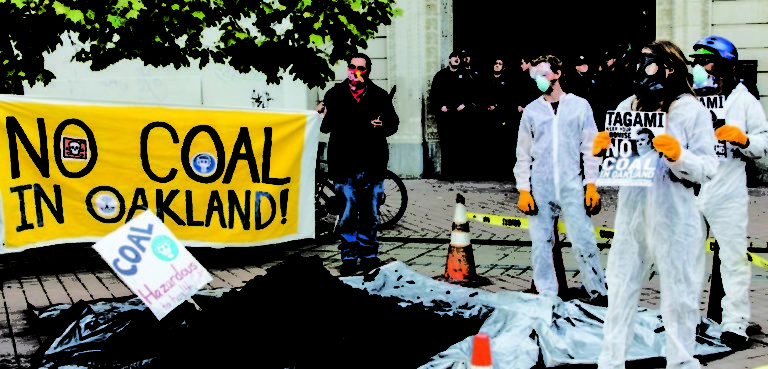City Leaders Determined to Fight Against Coal Terminal
May 26, 2018
Posted in coal dispute, Community, Elections 2018, Health, Libby Schaaf, Rebecca Kaplan

One of the many protests against the coal terminal held at the offices of developer Phil Tagami.
City leaders are pledging to continue to fight for “No Coal in Oakland” after a federal judge’s recent decision overturned the City of Oakland’s ban on shipping or handling coal in the city.
U.S. District Judge Vince Chhabria on May 15 ruled in developer Phil Tagami’s favor in his lawsuit against the City for breaching its contract by instituting the ban.
“This is a fight for environmental justice and equity. Oakland’s most vulnerable communities have unfairly suffered the burden of pollutants and foul air for too long. We will continue to fight this battle on all fronts,” said Mayor Libby Schaaf.
Many City Council members, who voted unanimously to ban coal in 2016, are saying they will continue their efforts to keep coal out of Oakland.
Tagami’s project, the Oakland Bulk & Oversized Terminal (OBOT), intends to ship coal, petroleum coke, and other commodities overseas through a new terminal at the site of the currently unused Oakland Army Base.
Oaklanders pushed back, concerned about potential health risks and poor air quality that could be caused by coal dust in West Oakland—already the area most affected by pollution in the city.
The City responded the next year with a ban on the shipping and handling of coal in Oakland. Judge Chhabria’s ruling determined that the City did not have enough evidence of health risks to warrant the ban, which breached the original contract. In his 37-page decision, Chhabria stated:
“Given the record before it, the City Council was not even equipped to meaningfully guess how well these controls would mitigate emissions.”
Councilmember Dan Kalb, who co-authored the coal ban with Schaaf, said he was appalled by Chhabria’s decision.
“There is no doubt that the scientific evidence shows there are substantial safety risks and health impacts of handling and moving nine million tons of dirty coal each and every year into and out of Oakland,” he said.
No Coal in Oakland, the activist organization that sprouted in response to OBOT’s plan to ship coal, released a long-winded statement on May 16 concerning Chhabria’s ruling.
In the statement, the group acknowledged that the ruling was fact-based. It also criticized Chhabria for his lack of legislative leadership in combating climate change. During the trial, Chhabria said it was “ridiculous to suggest that this one operation resulting in the consumption of coal in other countries will, in the grand scheme of things, pose a substantial global warming-related danger to people in Oakland.”
The City could appeal the decision, but activists and news commentators raise concerns that this course of action would be costly and likely unsuccessful.
The ruling specifically found that the City had breached its contract with OBOT by instituting the unsubstantiated coal ban after the agreement was made.
The City can still issue a new ordinance, which would have to be backed up by legal standards of “substantial evidence,” that the ordinance would prevent “substantial health risks.”
Councilmember Kalb has expressed his determination to continue resisting coal at the terminal. “I will do everything in my power to stand against attacks on the health and safety of our East Bay communities. The City should do whatever it takes within the law to make sure this coal terminal never gets built. This is critical to protect our residents, our workers, and our planet,” he said.
Councilmembers Rebecca Kaplan and Abel Guillén have also voiced their support of the fight against coal in Oakland. Tagami has not responded to a request for comment.